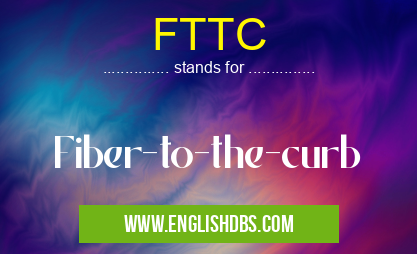What does FTTC mean in COMPUTING
FTTC, an acronym for Fiber-to-the-Curb, is a hybrid fiber-optic broadband technology that combines the benefits of fiber-optic and copper infrastructure to provide high-speed internet access to homes and businesses. In FTTC networks, fiber-optic cables are laid from the central office or telecom hub to a point near the customer's premises, typically a curb or junction box. From there, traditional copper telephone lines are used to connect the customer's home or office to the fiber network.

FTTC meaning in Computing in Computing
FTTC mostly used in an acronym Computing in Category Computing that means Fiber-to-the-curb
Shorthand: FTTC,
Full Form: Fiber-to-the-curb
For more information of "Fiber-to-the-curb", see the section below.
How FTTC Works
FTTC leverages the high bandwidth capabilities of fiber-optic cables for the long-distance portion of the connection, significantly reducing latency and increasing data transfer speeds. The use of copper for the last-mile connection ensures a reliable and stable connection, making FTTC a viable option for areas where fiber-optic cables cannot be directly installed to each premise.
Key Features
- Faster Internet Speeds: FTTC provides significantly faster upload and download speeds compared to traditional DSL or cable connections, enabling seamless streaming, gaming, and other bandwidth-intensive activities.
- Lower Latency: Fiber-optic cables transmit data at the speed of light, resulting in lower latency, which is crucial for applications such as online gaming and video conferencing.
- Enhanced Reliability: The use of fiber-optic cables for the long-distance portion of the connection provides a more reliable and stable connection, reducing the risk of interruptions and downtime.
- Future-Proof Technology: FTTC networks can support future advancements in broadband technology, including higher speeds and increased capacity, ensuring that users can stay ahead of the technology curve.
Benefits of FTTC
- Improved Internet Performance: FTTC significantly enhances internet performance, allowing users to enjoy faster downloads, smoother streaming, and improved gaming experiences.
- Enhanced Productivity: For businesses, FTTC provides a reliable and high-speed connection, enabling efficient collaboration, remote work, and improved customer service.
- Increased Property Value: Properties with FTTC access tend to have higher market value due to the increased connectivity and desirability of the location.
- Reduced Carbon Footprint: FTTC networks are more energy-efficient than traditional copper-only networks, reducing the environmental impact of broadband connectivity.
Essential Questions and Answers on Fiber-to-the-curb in "COMPUTING»COMPUTING"
What is FTTC (Fiber-to-the-Curb)?
FTTC is a broadband technology that delivers fiber-optic cables to a neighborhood's curbside or distribution point. From there, traditional copper cables are used to connect individual homes and businesses to the fiber network.
What are the advantages of FTTC?
FTTC offers faster internet speeds and lower latency than traditional copper-based broadband services. It also provides increased reliability and reduced signal interference.
What are the disadvantages of FTTC?
FTTC can be more expensive to install and maintain than other broadband technologies. Additionally, the copper cables used for the final connection can potentially limit the maximum speeds achievable.
How does FTTC compare to FTTH (Fiber-to-the-Home)?
FTTH delivers fiber-optic cables directly to the home, providing even faster speeds and lower latency than FTTC. However, FTTH can be more expensive to install and deploy.
Is FTTC available in my area?
The availability of FTTC varies depending on the location. To determine if FTTC is available in your area, contact your local internet service provider.
How much does FTTC cost?
The cost of FTTC installation and service varies depending on the provider and package selected. Contact your local internet service provider for pricing details.
Final Words: FTTC is a reliable and cost-effective broadband technology that combines the advantages of fiber-optic and copper infrastructure. It provides faster internet speeds, lower latency, and enhanced reliability, making it an ideal solution for homes and businesses seeking high-performance broadband connectivity. As technology continues to advance, FTTC will likely play an increasingly important role in meeting the growing demand for high-speed internet access.
